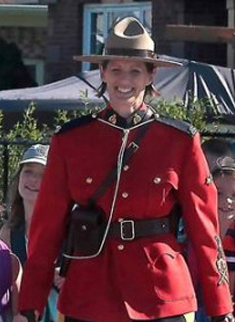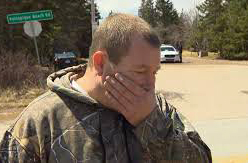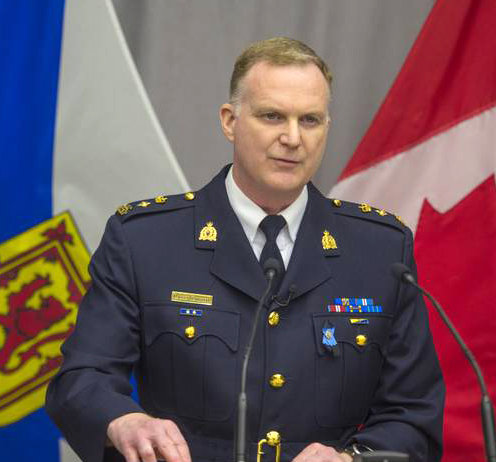
On Sunday, April 19, after as excruciating a night of pursuit as any known to her force, I’m sure, RCMP Const. Heidi Stevenson made the toughest decision of her life. She’d heard radio calls from a fellow constable nearby that he’d been shot by a murder suspect looking like an RCMP officer, driving what looked like an RCMP cruiser in Nova Scotia. She must have recognized the object of the all-night manhunt was taking deadly advantage of RCMP insignia to approach innocents and shoot them. She must have decided to at least try to take away that advantage. She spotted the impersonator and took drastic action.
“She rammed him,” Brian Sauvé of the National Police Federation told the Toronto Star, “and probably saved countless lives.”
Not, however, her own.
In the head-on collision that Const. Stevenson forced, the assailant then shot and killed her, stole her weapons, and was then forced to flee not as a constable, but as a civilian. Says Sauvé, “She was a hero.”
Information released by RCMP later indicated that the assailant likely shot Const. Stevenson with a pistol or a long-barrelled gun – one of them acquired in Canada, the others from the U.S. Given that this assailant managed to kill 21 others similarly – masquerading in a trusted uniform and in cold blood… Given that we have now witnessed Canada’s worst mass shooting in an otherwise peaceful, law-abiding corner of the country… And given that for weeks the country has lived in nearly 100-per-cent compliance with the “state of emergency” laws of the land – all of us feeling victimized by these killings – I feel compelled to ask an obvious question:
“Tell me, Public Safety Minister Bill Blair, isn’t now the time for a ban on handguns?”

And if my rationale is deemed by some an over-reaction, consider the plight of Clinton Ellison, who spoke to CBC News, after the murders. He explained that he and his brother Corrie had travelled to visit their father in Portapique, N.S., for the weekend and heard the gunshots up the road and then spotted the fires the murderer set to destroy evidence of his rampage. When Corrie failed to return from his reflex action to investigate and offer help, brother Clinton explored too and found his brother’s lifeless body.
“I could see blood, and he wasn’t moving,” Clinton Ellison told CBC. “I shut my flashlight off. I turned around and I ran for my life.” In nearby woods he shivered from fear and shock as the gunman apparently poked around in search of him. The killer gave up and moved on leaving Ellison feeling, “I’ll be traumatized for the rest of my life.”
As I watched footage of this young man remembering the selflessness of his brother and the horror of his night shivering alone in the dark, I multiplied his shock times the shock for all family members of those killed. It’s hundreds. And I thought of the thousands of other Canadians victimized by the shootings at École Polytechnique in Montreal, Danzig Street in Toronto, the mosque in Quebec City, the other police shootings in Mayerthorpe, Alta., and Fredericton, N.B., and the shootings in La Loche, Sask., that included the murder of teacher Adam Wood, from here in Uxbridge. And I try to speak for all that “collateral” trauma when I ask:
“Tell me, Pickering-Uxbridge MP Jennifer O’Connell, shouldn’t federal laws now reflect the views of the majority of your constituents against private ownership and operation of military assault weapons?”
If the impact on civilians fails to move our politicians to legislative action, consider the mental blow countless police forces have endured shift after shift, investigation after investigation, funeral after funeral. Like the thousands of wartime veterans, I’ve interviewed, who were forced by duty to push on after losing a brother, sister, platoon mate, squadron member, or shipmate in combat, I consider the sense of loss felt by Const. Heidi Stevenson’s force members, friends, husband Dean and children Connor and Ava.

Of her comrades’ reactions to the paralyzing events around Portapique last weekend, however, and the thought that must have crossed Const. Stevenson’s mind too as she came to that fateful decision to ram the murderer’s bogus police cruiser, I am haunted most by a press-conference comment from RCMP Supt. Darren Campbell:
“I can’t imagine any more horrific set of circumstances (than) when you’re trying to search for someone (who) looks like you,” he said, thinking of the assailant in an RCMP uniform and cruiser. “The dangers that causes…”
If for no other reason than as a plea for those Canadians sent out there to protect us, I pose this basic question to Justin Trudeau:
“Tell me, Prime Minister, isn’t it time to show the kind of leadership we’ve witnessed from New Zealand Prime Minister Jacinda Ardern and legislate stronger gun control – not to restrict lives, but to save them?”